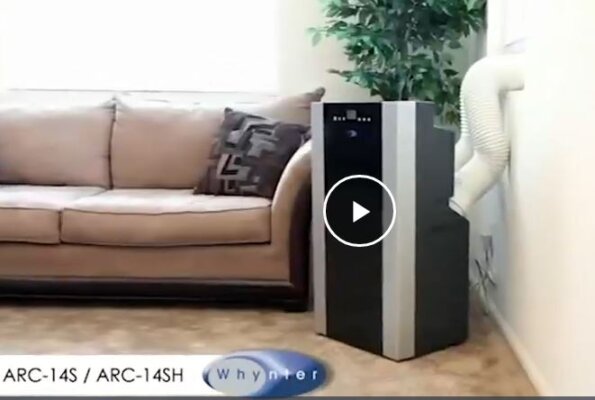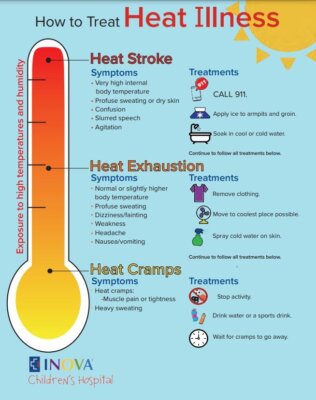Plan NOW for Extreme Heat

Official definition of Extreme Heat: Summertime temperatures that are much hotter and/or humid than average. That definition seems pretty innocuous, doesn’t it?
Let’s look a little deeper into definitions of “extreme heat:”
- 2-3 days of temperatures above 90 degrees plus high humidity (Read the P.S. when you get there!)
- a contributing factor to death (from heart attacks and strokes) and the underlying cause of twice as many deaths (from heat illnesses)
- often results in the highest annual number of deaths among all weather-related disasters.
So why am I writing about planning NOW for extreme heat? Take a look at this weather forecast from yesterday at @US_stormwatch:
An unusually strong signal is showing up in the long-range for a long-lasting major heatwave in California as we head towards mid-June. Much can change given this is 10 days out, but this strong of a signal this far out is definitely concerning. Stay tuned.
And then I went to weather.com and saw this headline:
The weather forecast for summer: Summer Temperature Outlook: Hotter Than Average for Much of Lower 48
So it’s clearly time to plan NOW for extreme heat expected within the next couple of weeks or couple of months.
Planning to be cool and comfortable at home when these weather patterns manifest?
Nearly 90% of homes in the U.S. have air conditioning, and A/C is what will protect you at home during a heat wave. Moving a portable fan around with you works, too. And there’s always ice cubes in the bathtub.
But what are your plans if you don’t have A/C? Or if the power is off?
In last summer’s heat wave in Oregon, 94 people died in Multnomah County.
- Most were over age 65.
- Most did not have A/C.
- And most were living alone, isolated in multi-family apartment buildings.
IF you fit any of these categories yourself, or have friends who do, you need to start planning NOW fpr how you will cope. Given global supply chain problems and rising inflation, if you wait to make essential purchases they will only cost you more!
Some questions to help your planning for extreme heat days.
How will you get the NEWS that a heat wave is coming?
Are you signed up to get weather alerts from your utility or your city or county? Generally, they won’t automatically contact you. It’s up to you to get on their list. If you don’t have access to the internet, call customer service at your utility and ask for assistance. (If you are on one of the utility special programs — low income or medical — find out NOW what help they will give you during a weather emergency or power outage.)
What changes can you make to your HOME now to help keep it cool?
Keeping the cool air in is as important as keeping the hot air out. Open windows very early to capture cool air, then shut everything up. If air leaks around your doors and windows, get busy with weather-stripping now, before the heat hits.
Consider whether some sort of reflective window film on windows could keep direct sunlight at bay. (Not all landlords allow this film.) The link takes you to an example of film that comes in multiple colors and is non-adhesive, i.e., easily removable.
If you can afford it, consider buying a room air conditioner. Note the distinction: a PORTABLE air conditioning unit, designed to cool one room or two, can cost around $350 (or more, of course). It probably weighs upwards of 50 lbs. and may be about the size of a large kitchen trash can. A PERSONAL air conditioning unit sits on the table near you and cools — you!
Some examples of PORTABLE A/C units. (They roll into place.)

This image (not a playable video) is from the promo video of one of the largest portable A/C units, capable of cooling up to 500 sq. ft.. Note the hoses that exhaust air out through the nearby window. This unit has three functions managed by a remote: cooling, humidifying, or fan only. Click here to go to Amazon for full details (and to see the videos).
For comparison, here’s a link to another popular model. It is slightly more than half the size, has slightly more than half the cooling capacity and its price is — you guessed it, slightly more than half the price of the large model shown in the photo. Shop to get the right size for your needs.
A PERSONAL air conditioner is meant to put on a table near you to cool just you.
These small appliances start at around $50. Add water (and ice cubes?) to turn the fan into a humidifier. Please note that SOME of the personal air conditioners do not meet air filter standards for California, so check before you order. The model below uses battery power — so would be good choice if you could potentially be hit by a power outage. Click the image to see details and current price at Amazon, where we are associates. Remember, summer is nearly here so prices may be changing on these weather-related items.

A simple tabletop electric fan can help, too.
Just remember, a fan creates air flow but doesn’t cool. If the temperature gets up higher than 95 degrees, a fan could increase your chances of getting sick with heat illness!
Simple fans can be round or flat or built like a tower. They usually have multiple speeds. If you want oscillation, be ready to add a few more dollars to the price. I like the simple fan below from Vornado. The manufacturer has literally dozens of different styles and colors – so you can find perfect gifts for summer celebrations! Click this link for details of this flat panel model.

What is your plan for keeping YOURSELF cooler in extreme heat?
It makes common sense to avoid going out in the heat. So make plans now to stick close to home if at all possible. That way you can also dress VERY lightly, take a cool shower and even dampen your skin and clothes for extra cooling in front of that fan.
Drink plenty of water.
Avoid creating heat inside your house by having “hot day menus” that don’t involve cooking. Let the laundry go for a day or two. See if you can cut back on computer and TV usage, too – these appliances all generate heat.
What is your plan if the house simply gets too hot?
Start making a list NOW of buildings you know have good air conditioning and where you would have a comfortable place to sit if you went there. For example: library, city offices, mall.
Do you know where your utility or your city is likely to have established Cooling Centers? Cooling Centers are required in an emergency! Your challenge will be to find out where centers are open and whether they still have room for you.
Three immediate steps to take NOW for your personal preparedness plan.
- Go online NOW (or call your city) to get a list of where Cooling Centers are located. Figure out how far away they are and how best to get there.
- Get the phone number NOW of whom to call when the emergency hits, to find out which centers are open and their status. If you have a pet, be sure to ask about bringing your pet to the Cooling Center BEFORE you just show up.
- Write down the locations and the phone numbers and place this info NOW with your Emergency Go-Bag.
AND JUST IN CASE: Are you prepared to help yourself or others in the case of heat-related illness?
We’ve all been “overheated.” But when does “overheated” become life-threatening? Say you are checking on a neighbor, who doesn’t seem quite right. Knowing the levels of heat illness will help assess the situation. At the top, and most dangerous, is Level Three.

- Level Three: Heat Stroke. Internal heat, no sweat, rapid pulse, confusion. CALL 911, cool down with shade, damp cloths, etc.
- Level Two: Heat Exhaustion. Sweating, paleness, dizziness, nausea. Get into shade. Remove clothing. Sip cool sports drinks.
- Level One: Cramps. Pains, spasms. Get into shade. Sip cool sports drinks with salt and sugar.
Download the full-sized pdf of this flyer here.
Well, I think we’ve covered extreme heat pretty well today, with some simple to-dos. And if you aren’t quite prepared, now is the time. Don’t let it be too late!
Virginia
Your Emergency Plan Guide team
P.S. The Heat Index calculator combines temperature and relative humidity to give you a better way to plan for potential danger. Just get the two numbers for your location and plug them into this calculator .
